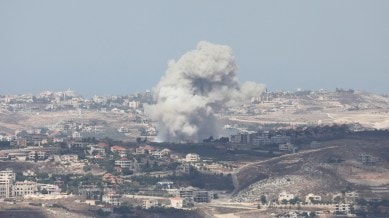Stay updated with the latest - Click here to follow us on Instagram
Israeli airstrikes on Hezbollah: Nearly 500 killed in Israeli airstrikes in Lebanon as escalation intensifies
Thousands of communication devices used by Hezbollah members exploded in an attack widely attributed to Israel, although Israeli officials have not confirmed or denied their involvement.

Lebanon has witnessed its deadliest day in almost two decades, with approximately 500 fatalities and over 1,645 injuries resulting from Israeli airstrikes aimed at Hezbollah.
This surge in conflict comes as Israel shifts its focus to its northern border, where Hezbollah has been launching rockets in solidarity with Hamas, currently engaged in an ongoing conflict with Israel in Gaza.
monthly limit of free stories.
with an Express account.
Israeli Defense Minister Yoav Gallant addressed the nation, stating, “We are deepening our attacks in Lebanon, and these actions will continue until we can ensure the safe return of residents in the north.” He urged the public to remain calm during these challenging times, emphasizing the government’s commitment to protecting its citizens.
The Israeli military has concentrated its efforts on Hezbollah positions in various regions, including southern Lebanon, the eastern Bekaa Valley, and northern areas near the Syrian border.
Israeli army spokesperson Avichay Adraee confirmed through a post on X that more than 300 Hezbollah targets had been struck, warning of imminent airstrikes on residential areas where the militant group is believed to be storing weapons. He emphasized that these measures are essential for dismantling Hezbollah’s military capabilities.
In retaliation, Hezbollah has launched a series of rockets aimed at Israeli military posts. The increased Israeli airstrikes have pressured the group, which recently faced a significant setback, described by Secretary General Hassan Nasrallah as a major blow to the organization’s history. Thousands of communication devices used by Hezbollah members exploded in an attack widely attributed to Israel, although Israeli officials have not confirmed or denied their involvement.
An Israeli airstrike last Friday targeted a location in Beirut’s southern suburb, killing 45 individuals, including 16 members of Hezbollah, among them prominent leaders Ibrahim Aqil and Ahmed Wahbi. This attack has further strained tensions as Hezbollah grapples with the repercussions of these losses.
The escalation has sparked widespread fear and anxiety among residents in southern Lebanon. Imad Kreidieh, head of Lebanese telecom company Ogero, reported over 80,000 automated calls instructing people to evacuate their areas. However, not all calls were responded to, leading Kreidieh to describe the situation as “psychological warfare.”
Many residents received urgent evacuation advisories, with reports indicating notifications even reached residents in Beirut. Information Minister Ziad Makary dismissed these calls as psychological manipulation, asserting, “This is a psychological war,” and confirmed that the ministry would not comply with such orders.
Concerns of a full-blown war loom large. Joseph Ghafary, a state employee in eastern Beirut, expressed fears that Hezbollah may respond aggressively to Israel’s intensified strikes, potentially triggering a more extensive conflict. “If Hezbollah carries out a major operation, Israel will respond and destroy more than this. We can’t bear it,” he stated, echoing the apprehension felt by many in the region.
Rear Admiral Daniel Hagari, spokesperson for the Israeli military, confirmed that evacuation warnings were being disseminated across all networks in Lebanon. When asked about the possibility of a ground incursion into Lebanon, Hagari stated, “We will do whatever is needed” to ensure the safety of evacuated residents in northern Israel.
In a media briefing, Hagari presented aerial footage purportedly showing Hezbollah operatives attempting to launch cruise missiles from a civilian structure in Lebanon. He reiterated the justification for the airstrikes, stating, “Hezbollah is endangering you and your families.”
As Israeli warplanes continued their operations, airstrikes were reported in towns along Lebanon’s southern border and further north, marking a significant escalation in the conflict. Witnesses noted that a rocket hit an uninhabited mountainside east of Byblos, an area previously untouched by airstrikes, underscoring the expanding scope of Israel’s military actions.
Residents in the southern port city of Tyre reported hearing low-flying warplanes and a series of nearby airstrikes, while Hezbollah’s al-Manar indicated that attacks also occurred in the Hermel area of northern Lebanon, highlighting the broad reach of the Israeli military’s operations.